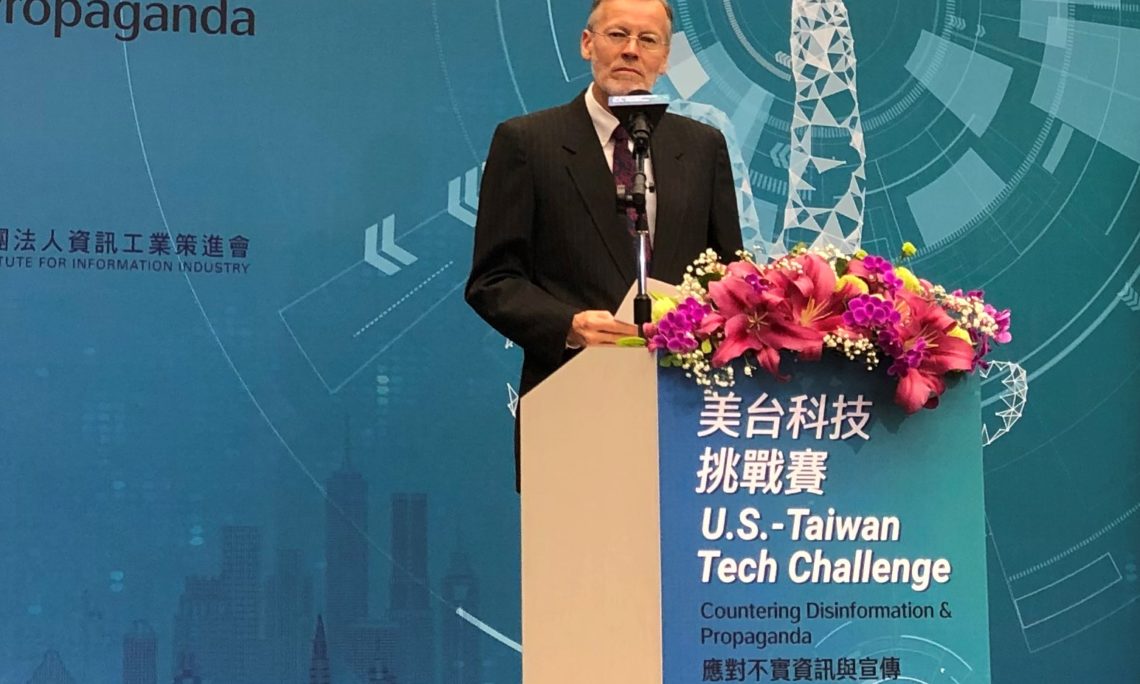OT-2004
February 20, 2020
Remarks by AIT Director W. Brent Christensen
at U.S.-Taiwan Tech Challenge Day 2
February 20, 2020
(As Prepared for Delivery)
Minister Lo, Executive Secretary Tsai, Principal Deputy Coordinator Kimmage, distinguished guests and friends, good morning. On behalf of the American Institute in Taiwan, it is my honor and distinct pleasure to welcome everyone to day two of the U.S.-Taiwan Tech Challenge: Countering Disinformation and Propaganda.
I would like to acknowledge and thank our State Department colleagues from the Global Engagement Center, our partners from Park Advisors in the United States and the Institute for Information Industry here in Taiwan, for their collaboration in organizing and hosting this event. I would also like to thank the representatives of the seven companies that competed in the tech challenge competition yesterday – which included two overseas participants from Israel and Australia – for taking the time to be a part of this endeavor by sharing your innovative technology solutions with us. I know our audience is looking forward to hearing from you in the first panel session this morning.
Today, information – or its weaponized counterpart, disinformation – is emerging as a powerful tool used by our adversaries to inflict harm on our societies. Disinformation questions objective reality, and degrades the concept of truth, which, over time, can cripple a functioning democracy. Disinformation exacerbates existing divides within our societies, and in the worst cases, confuses the public about issues concerning their public safety and civic participations: the Australian bush fires, the recent Taiwan elections, and now the Novel Coronavirus, are all recent examples. We are at a crucial moment, when we must better understand the challenge we are facing and develop effective solutions. And so I am very pleased to see so many of you here today interested in greater awareness of the problem set and learning more about innovative technology solutions to countering disinformation and propaganda.
Tackling disinformation is one of the most vexing and complex challenges facing democratic societies around the world today. The United States’ National Security Strategy describes a geopolitical competition between free and repressive visions of governance that is playing out in this region and beyond. Nowhere is this more true than on the information battlefield. The United States is grappling with the spread of disinformation, particularly as foreign actors seek to use social media to influence our elections, divide the American public, and undermine confidence in our democratic institutions.
Taiwan is also on the frontline of the disinformation battlefield and faces challenges from a determined opponent. China has invested heavily to develop ever-more sophisticated ways to anonymously disseminate disinformation through a number of channels, including social media. As their malign methods evolve, the motivation remains the same – to weaken Taiwan’s hard-won democracy and freedom.
A major challenge we all face is protecting the integrity of our democratic institutions in the context of disinformation. There are those who seek to use the openness of the internet to sow division, create polarization, and even spread outright falsehoods. Malign actors believe that if they can make our societies more polarized and less able to distinguish fact from fiction, then people will begin to lose faith in democratic institutions.
These actors also believe that they can scare our democratic governments into restricting our rights by challenging our security. They know that confronting disinformation puts into tension two responsibilities that democracies hold sacred: protecting freedom of speech and securing our people from threats and encroachment.
We are here today to discuss how to help our societies resist malign disinformation in a way that does not restrict human rights and fundamental freedoms of our citizens. Unlike authoritarian governments, we believe in the rights of the individual. Maintaining the integrity of our systems of governance and balancing the competing values of freedom and security is a critical 21st century challenge, and one we can and must face together.
One of the ways we like to characterize the U.S.-Taiwan relationship is Strive Together, Thrive Together or “共同努力,共同得益.” The United States and Taiwan are capable partners, well equipped to tackle the challenges of disinformation.
We are working together to facilitate information sharing between the United States and Taiwan’s leadership so that we can benefit from each other’s best practices and better understand this common threat. We are also working together to share our experiences and expertise with other countries in the Indo-Pacific and around the world. To that end, over the past two years, we have held two media literacy workshops under the Global Cooperation and Training Framework, and a TechCamp for hacktivists, social media influencers, and journalists from around the region, all focused on disarming disinformation and cultivating media literacy.
The challenge of disinformation is something no one society or government can do alone, which is why gatherings like this are so crucial. We must all work together to mobilize our civil societies – teachers, journalists, NGOs, academics, and the tech community – to find innovative solutions and build resilience within our communities. I am confident that we have assembled just the right people at this Tech Challenge to reach new heights in developing technology innovations for the set of challenges at hand.
I would close by reminding everyone that strong societies benefit from real news; flawed governments traffic in fake news. The United States, Taiwan, and other democracies have great stories to tell. We benefit when people understand the truth. Disinformation is a means of deflecting attention away from the consequences of bad governance and obscuring the successes of good governance.
I trust today’s discussions will be fruitful and I look forward to hearing your innovative ideas.
















![Video Thumbnail [Recovered]-01](../wp-content/uploads/sites/269/Video-Thumbnail-Recovered-01-1-750x450.jpg)






